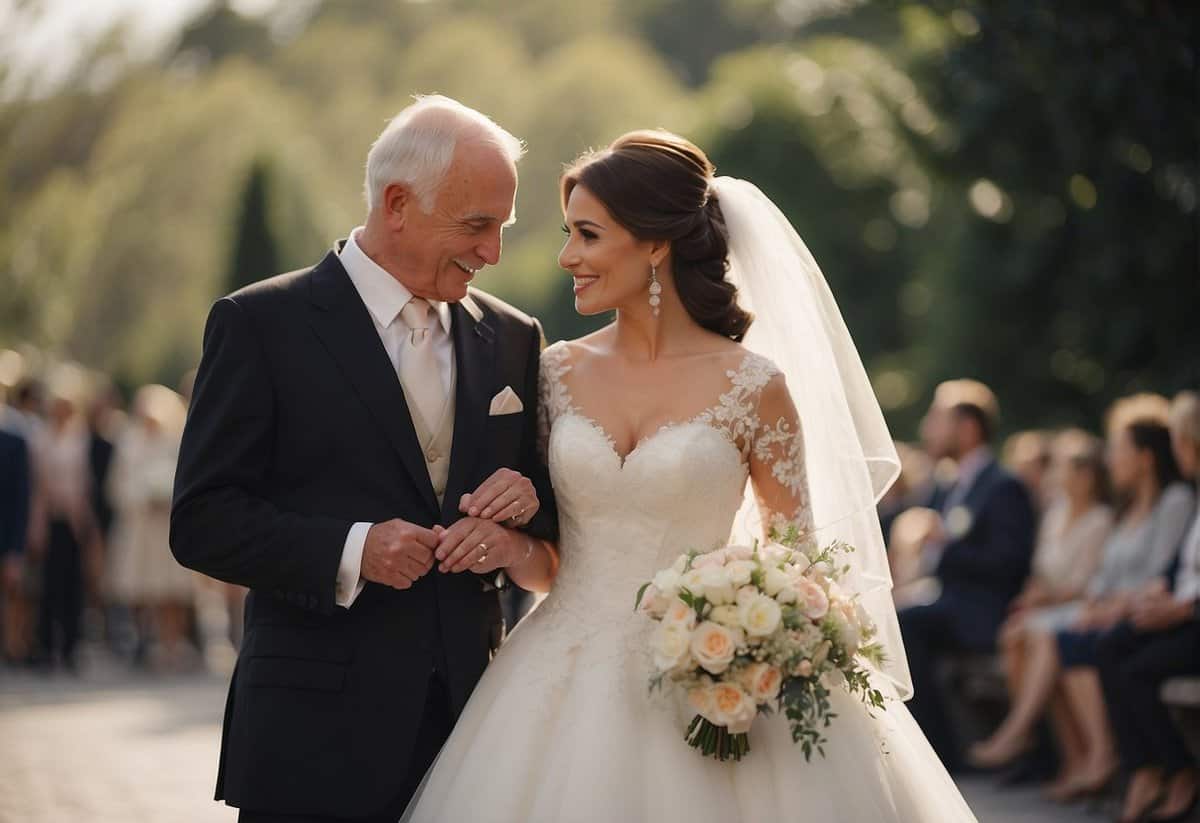Does the Father of the Bride Pay for a Second Wedding? Exploring Modern Etiquette
When planning a second wedding, questions often arise regarding traditional wedding etiquette and financial responsibilities. You may wonder if the father of the bride is expected to pay for his daughter’s wedding again. Traditionally, the bride’s family would handle many of the expenses for a first marriage, but second weddings can present a different set of expectations and norms.

Second weddings often invoke a more modern approach to financial planning and roles. As societal norms continue to evolve, the financial burden of a wedding is frequently shared amongst the participating parties, including the couple themselves. It’s not uncommon for the bride and groom to finance their own ceremonies or have a more collaborative approach involving both families. Wedding etiquette for second nuptials tends to be less rigid, allowing for more flexibility when it comes to who pays for what.
Key Takeaways
- Traditional rules about wedding payment responsibility are less strict for second weddings.
- The bride and groom often contribute to or pay for their own second wedding expenses.
- Collaborative financial planning for the wedding may involve both families equally.
Bridal Financial Traditions

When you’re planning a wedding, understanding who traditionally pays for what can help guide your budgeting decisions.
Historical Perspectives
Historically, wedding financial responsibilities fell squarely on the bride’s family. This tradition, known as the dowry or bride price, is rooted in the idea that the bride’s family is offering support to the couple’s new life together. Typical expenses they covered included the ceremony and reception, with items like the wedding planner and invitations.
Modern Expectations
In modern times, there’s a shift in these traditions. Nowadays, wedding costs are often more evenly split between the families, and it’s not uncommon for the couple themselves to contribute significantly. For a second wedding, the expectation for the bride’s father to foot the bill is even less pronounced. Shared costs reflect current trends in financial equality and the recognition that paying for a wedding is a substantial burden for just one family. It’s now more about your personal circumstances than adhering to a strict tradition of who pays for what.
Planning and Budgeting for the Wedding

When planning a wedding, whether it’s your first or a subsequent one, establishing a clear budget is key to successfully managing expenses. Your understanding of who traditionally pays can inform your conversations about financial responsibilities.
Establishing a Budget
Begin by setting a total budget for your wedding. This figure should reflect your current financial situation and consider any contributions from family members. For a second wedding, there’s often more financial flexibility, but it’s still important to set realistic expectations about what you can afford.
Allocating Expenses
Traditionally, the bride’s family might pay for a larger portion of the expenses, but when planning a second wedding, costs can often be more evenly split. Discuss with all parties involved to decide if and how expenses will be shared. Here’s a simple breakdown to consider:
- Venue and Catering: Can be the most significant part of the budget.
- Attire: Includes the dress, suit, and accessories.
- Wedding Rings: Each party typically pays for the other’s ring.
- Expect to cover additional costs such as invitations and photography.
The Role of the Wedding Planner
A wedding planner can be pivotal in managing your wedding budget and relieving stress. They’re a resourceful investment for overseeing details small and large, and ensuring you stay within your financial means. For planning a second wedding, they can provide guidance tailored to your unique situation.
The Role of the Bride’s Parents

When your daughter gets married for the second time, the traditional roles of the bride’s parents can vary greatly. As parents, you might find yourselves questioning what’s expected when it comes to hosting and other customary contributions.
Ceremony and Reception Responsibilities
Your role as the bride’s parents often includes hosting the reception, but for a second marriage, it’s not uncommon to share or pass on this responsibility. Whether it’s your first time playing the host or you’re experienced, remember to:
- Provide a welcoming atmosphere for guests.
- Help determine the size of the guest list.
- Possibly contribute to the reception venue selection, if expected.
What’s essential is ensuring that the celebration reflects the bride’s desires and the unique circumstances of a second marriage, which might be more laid-back than her first.
Additional Considerations for Second Marriages
In a second wedding, financial and emotional support still holds significance, but your contributions might differ:
- Wedding Dress: You might go dress-shopping with your daughter or offer advice, though she may choose to handle this differently than in her first wedding.
- Officiant: Discuss with your daughter the choice of an officiant who can make the ceremony special for her and her partner.
- Engagement Party: Hosting an engagement party or destination wedding is not typically expected, particularly if your daughter’s prospective parents-in-law are looking to contribute.
- Divorced Families: If you’re divorced, it’s crucial for both of you to coordinate efforts and keep the experience positive.
Remember, your support and presence are what truly matter, making the day memorable for your daughter as she celebrates this new chapter in her life.
Contributions Beyond Financial

When considering your role as the father of the bride for a second wedding, it’s essential to recognize that your contribution can extend far beyond just financial support. Your involvement can include emotional backing and active participation in wedding events that reinforce your relationship with your family and your daughter’s new life chapter.
Emotional and Logistical Support
Your emotional and logistical support during the wedding planning can be invaluable. By offering a listening ear and a steadying influence, you help create a supportive environment. Assisting with logistics, like coordinating transportation for family and the bridal party or helping to select attire for the bridesmaids and groomsmen, shows your commitment to the success of the day.
Participation in Wedding Events
Your involvement in various wedding events is a testament to your support. You might host the bridal shower or give a meaningful speech or toast during the reception. Participating in the parent dance with your daughter can be a heartfelt highlight. Offering to do a reading during the processional or engaging on the dance floor with family and friends demonstrates your enthusiasm for celebrating your daughter and her new husband.
Frequently Asked Questions

In navigating the waters of second wedding etiquette, you may have some pressing queries. Below are concise answers to frequently asked topics to guide you through the process.
Is it customary for the groom’s parents to contribute to the cost of a second wedding?
Traditionally, the groom’s parents may offer to pay for certain aspects of a second wedding, but this is not a strict rule. Contributions should be discussed and agreed upon by all parties involved.
What are appropriate gift suggestions for someone’s second marriage?
For a second marriage, consider choosing gifts that add to the couple’s combined life, such as experiences or items for a hobby they share. Personalized gifts that celebrate their union are also a thoughtful touch.
Can you have a traditional bachelorette party if it’s your second marriage?
Absolutely. If it brings you joy, feel free to have a traditional bachelorette party for your second marriage, although some opt for a more low-key gathering with close friends and family.
Are there special considerations for inviting guests to a second wedding ceremony?
When planning a second wedding, the guest list is often smaller and more intimate. Prioritize inviting the people who are most important to you and your partner.
In a second marriage, how should the couple approach the expense of the rehearsal dinner?
The couple should discuss their rehearsal dinner expenses openly and decide whether they will cover the cost themselves, or if they will accept help from family members.
Who traditionally gives the bride away if it’s her second wedding?
For a second wedding, the bride can choose anyone significant to her to give her away, or she may choose to walk down the aisle alone as a symbol of her independence.

